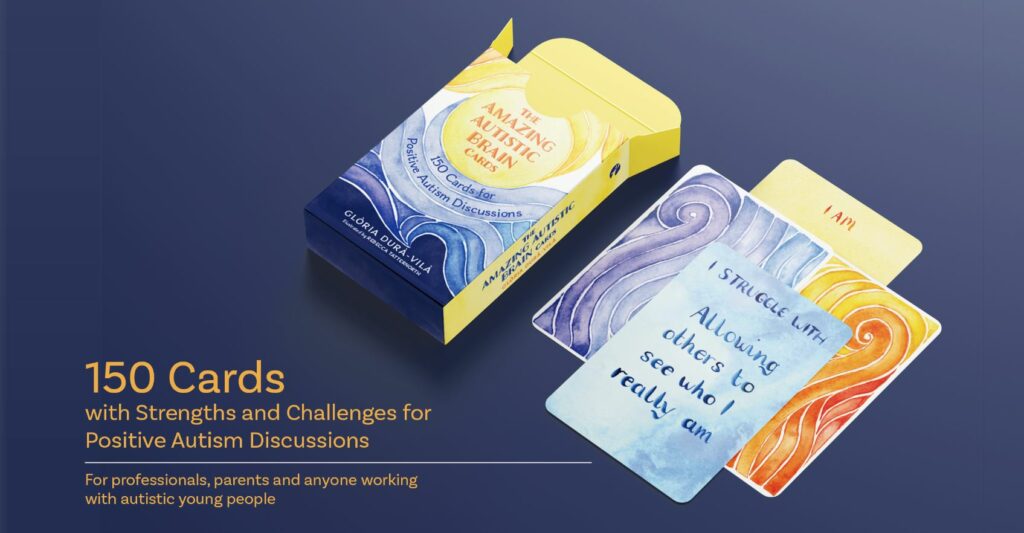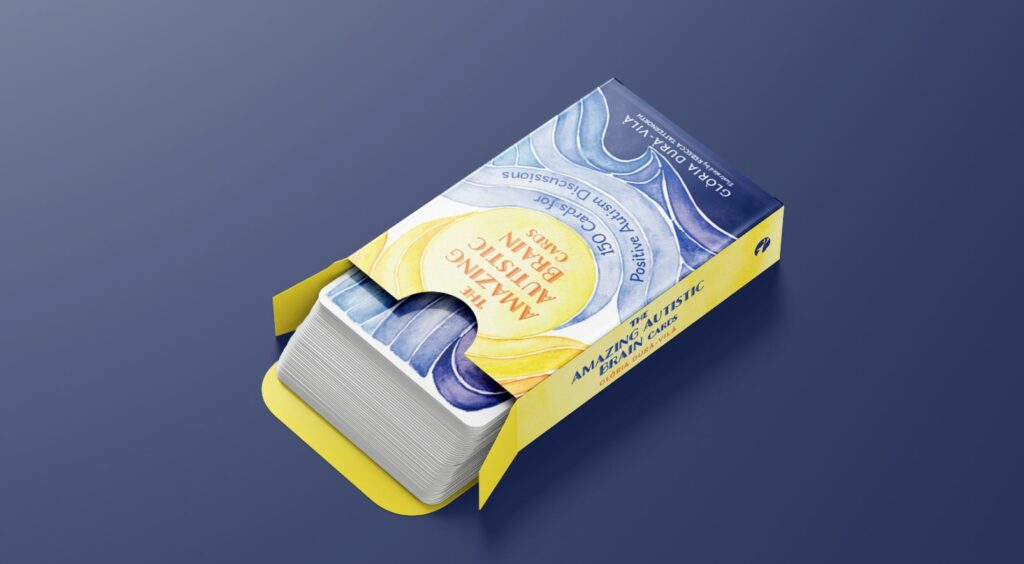The Amazing Autistic Brain Cards were created by Dr Gloria Dura Vila, based on her experiences as a diagnostician, helping young people and their families to receive and understand their new autism diagnosis in a positive and personalised way. Each card contains a strength or a challenge, use them to discuss and build your unique profile, and learn about how autism makes you, you! There are even some blank reusable cards so you can add your own traits too.

What’s in the Box?
The contents of the box – the cards and the booklet, were put together as a resource to help doctors, psychologists and other health professionals give the Autism diagnosis to young people in a personalised, empowering and meaningful way. As I will explain below, these cards are also helpful for parents, teachers and anyone with the good fortune to work with autistic children and young people. The cards and the ideas, thoughts, tips and advice contained here come straight from what I have learned working with autistic children and their parents.
The deck of cards, demonstrating the strengths and challenges that can be found in autistic people, is one of the resources I use in my clinical practice. The cards are seeing the light of day by popular demand from colleagues, parents, teachers and trainees who have seen me using them over the years. The cards are mainly designed to help children and young people with Autism to understand their diagnosis in a personal and positive way.
Those who know me personally, or even through my books, will know very well how passionate I am about sharing and explaining the Autism diagnosis to a young person in the best possible way.
I firmly believe that the way the Autism diagnosis is given has a huge impact on how young people (and their parents) feel about it, incorporate it into who they are, deal with the difficulties they will encounter in their paths, and embrace and become aware of the positives.

Lots of clinicians and parents have told me that they find sharing the diagnosis nerve-racking and anxiety-inducing and are not sure exactly how to go about it. They have also asked me on countless occasions what I think is the best age to share the diagnosis with a child. The answer is simple: the earlier the better. Obviously, the way in which to tell them has to be adapted to their age and take into account their cognitive and verbal ability. Autistic children themselves often already know they are different, with many of them being acutely aware of their challenges, and they can take great pains to mask these with severe consequences for their mental health.
Being different, struggling with certain things that seem to come naturally to their siblings or classmates, without an understanding of why this is the case and how to deal with it, leads to frustration, anxiety and low self-esteem in a child, and leaves parents and others involved in their care confused and powerless. By giving an Autism diagnosis we are giving understanding, and hope to make things easier and better for these children. The Autism diagnosis should be a sort of compass for parents, teachers and other professionals to guide their parenting and teaching towards the child’s needs.
I have heard plenty of times from young people that not knowing the reason behind their challenges was incredibly hard and a source of a lot of suffering. Conversely, so many children and young people (and their parents) have shared with me the relief of hearing that it is not their fault and that they are no longer ‘oppositional’, ‘naughty’ or ‘difficult’, but a wonderful autistic child with both strengths and challenges – just the same as any human being.
I have never met an autistic person who preferred not to know about their Autism.
My long-held passion to communicate what having Autism means to young people in a positive and accurate way that will help them understand themselves better, compelled me to write the bestselling My Autism Book: A Child’s Guide to their Autism Spectrum Diagnosis. The same passion lies behind this new project, I hope that these cards and the tips contained in this booklet will be an aid and an ally in your journey to help autistic young people to gain more self-awareness as they grow and mature.
The Amazing Autistic Brain Cards are available here from 21st July, or wherever you buy books. If you would like to read more articles like this and get the latest news and offers on our books about autism, why not join our mailing list? You may also be interested in our Facebook page or Twitter page.